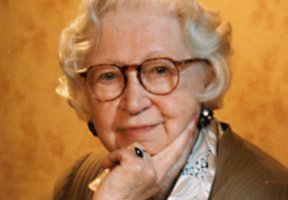Moral Courage: Miep Gies 1909 -2010, RIP
Tuesday, January 12th, 2010

Miep Gies and Otto Frank
Miep Gies, who sheltered Anne Frank and her family from arrest by the Gestapo for two years died today. She was 100 years old.
Gies’ Web site reported that she died Monday after a brief illness. The report was confirmed by museum spokeswoman
Maatje Mostar, but she gave no details. The British Broadcasting Corp. said she died in a nursing home after suffering a fall last month.
Gies was the last of the few non-Jews who supplied food, books and good cheer to the secret annex behind the canal warehouse where Anne, her parents, sister and four other Jews hid for 25 months during World War II
….Anne Frank died of typhus at age 15 in the Bergen-Belsen concentration camp in March 1945, just two weeks before the camp was liberated. Gies gave the diary to Anne’s father Otto, the only survivor, who published it in 1947.
After the diary was published, Gies tirelessly promoted causes of tolerance. She brushed aside the accolades for helping hide the Frank family as more than she deserved – as if, she said, she had tried to save all the Jews of occupied Holland.
“This is very unfair. So many others have done the same or even far more dangerous work,” she wrote in an e-mail to The Associated Press days before her 100th birthday last February.
….I don’t want to be considered a hero,” she said in a 1997 online chat with schoolchildren.
“Imagine young people would grow up with the feeling that you have to be a hero to do your human duty. I am afraid nobody would ever help other people, because who is a hero? I was not. I was just an ordinary housewife and secretary.”
Had Miep’s complicity in hiding the Frank and Van Dam families been discovered by Nazi authorities in occupied Holland, she would have been arrested by the Gestapo, interrogated and then deported to a concentration camp in the Third Reich, as happened to other Dutch citizens resisting the Final Solution.
What can we say about Miep Gies? At a time when many lent a hand or their silence to genocide, she chose to act, with full knowledge of the potential consequences. Such moral courage is daunting. Measuring ourselves against her example, most of us are found to be  wanting. We are less than she, not because she did more but because in her place we might not have done at all.
wanting. We are less than she, not because she did more but because in her place we might not have done at all.
Some people, as in Rwanda or Ethiopia or Cambodia or Bosnia or Timor or Sudan not only fell short of Miep’s standard, they picked up a machete or an axe or a gun and threw in with the perpetrators and helped pave the way to Hell.
Sadly, Western governments sometimes served to grease the skids when they could have lent their power and prestige or at least their words, to impeding genocide. In our polite and still civilized society, no one would call our bureaucrats with pale demeanors and gray suits who ceremoniously dissembled and piously parsed phrases on TV, taking a smirking pride in their sophistic cleverness, their ability to rationalize complete inaction, “Eichmann“. No one will say that to them.
Not until Judgment Day.


